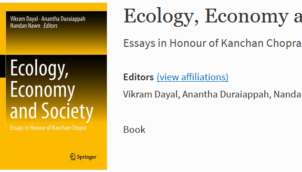
By Joan Martinez-Alier.
Abstract
There is a fundamental clash between economy and the environment due to the growing social metabolism of industrial economies. Energy cannot be recycled. Therefore, the energy from the fossil fuels is used only once, and new supplies of coal, oil, and gas must be obtained from the “commodity extraction frontiers.” Similarly, materials are recycled only in part, and therefore, even an economy that would not grow would need fresh supplies of iron ore, bauxite, copper, and paper pulp. The industrial economy is entropic. Meanwhile, permanent “funds” such as aquifers, forests, and fisheries are overexploited, the fertility of the soil is jeopardized, and biodiversity is depleted. Thus, the changing social metabolism of industrial economies (including waste disposal such as the excessive production of carbon dioxide) gives rise to growing numbers of ecological distribution conflicts that sometimes overlap with other social conflicts on class, ethnicity or indigenous identity, gender, caste, or territorial rights. The term ecological distribution conflicts (EDC) was coined to describe social conflicts born from the unfair access to natural resources and the unjust burdens of pollution. Such conflicts give birth to movements of resistance, to the point that we can speak already of a global movement for environmental justice.
Link
https://link.springer.com/chapter/10.1007%2F978-981-10-5675-8_11
email hidden; JavaScript is required
How to cite
Martinez-Alier J. (2018) Ecological Distribution Conflicts and the Vocabulary of Environmental Justice. In: Dayal V., Duraiappah A., Nawn N. (eds) Ecology, Economy and Society. Springer, Singapore

The project ENVJUSTICE has received funding from the European Research Council (ERC) under the European Union’s Horizon 2020 research and innovation programme (grant agreement No. 695446)